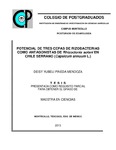| dc.contributor.author | Pineda Mendoza, Deisy Yubeli | |
| dc.contributor.author | PINEDA MENDOZA, DEISY YUBELI | |
| dc.creator | PINEDA MENDOZA, DEISY YUBELI; 510477 | |
| dc.date.accessioned | 2018-09-25T18:11:34Z | |
| dc.date.available | 2018-09-25T18:11:34Z | |
| dc.date.issued | 2015 | |
| dc.identifier.uri | http://hdl.handle.net/10521/2904 | |
| dc.description | Tesis (Maestría en Ciencias, especialista en Edafología).- Colegio de Postgraduados, 2015. | es_MX |
| dc.description.abstract | Actualmente se están buscando nuevas alternativas sustentables que permitan disminuir el uso de sustancias químicas para controlar enfermedades en cultivos agrícolas. Entre estás, los biopesticidas de origen microbiano tienen gran potencial para controlar fitopatógenos. En la presente investigación se evaluó la capacidad de tres cepas de rizobacterias (Pseudomonas tolaasiiA46, P. tolaasii P61 y Ewingella americana108) para inhibir el crecimiento del hongo fitopatógenoRhizoctonia solani. Se encontróbajo condiciones in vitroque dos cepas (P61 y 108) inhibieron en 49% el crecimiento radial de R. solani, mientras que la tercera sólo inhibió al hongo en 37%.Los filtrados obtenidos de cada una de estas cepas mostraron actividad antifúngica; siendo más marcadaen el filtrado de la cepa 108.El co-cultivo bacteria-hongo en medio líquido no incrementó la actividad antifúngica de los filtrados bacterianos. Las tres cepas no mostraron actividad quitinolítica; pero las cepas A46 y P61 resultaron positivas para la producción de sideróforos. Se seleccionó la cepa 108 para evaluar su actividad en cuatro medios (Luria Bertani, King B, medio nutritivo y papa dextrosa);el mejor medio fue papa dextrosa, donde la bacteria y el filtrado obtenido presentaron la más alta actividad antifúngica contra Rhizoctonia solani. Así mismo, bajo condiciones de invernadero,la aplicación del filtrado en plantas de chile inoculadas con R. solani, disminuyó el número de plantas muertas con respecto al control. _______________ POTENTIAL OF THREE RHIZOBACTERIA STRAINS AS ANTAGONISTS OF Rhizoctonia solani IN SERRANO CHILI PEPER (Capsicum annuum L.). ABSTRACT: Currently, new sustainable alternatives to reduce the use of chemicals for controling diseases in agricultural crops are been searching. Among these, microbial biopesticides have great potential to control plant pathogens. In this research capacity of three rhizobacteria strains (Pseudomonas tolaasii A46, P. tolaasii P61 and Ewingella americana 108) to inhibit growth of the phytopathogenic fungus Rhizoctonia solani was evaluated. It was found that two strains (P61, 108) inhibited the radial growth of R. solaniby 49% under in vitro conditions, while the third bacterial strain inhibited the fungus only by 37%. The filtrates obtained from each of these strains showed antifungal activity; it was more marked in the filtrate of strain 108. The co-culture bacteria-fungus in liquid medium did not increase the antifungal activity of the bacterial filtered. The three strains did not show chitinolytic activity but the A46 and P61 strains were positive for the production of siderophores. The 108 bcterial strain was selected to evaluate its antifungal activity in four media (Luria Bertani, King B, nutrient medium and potato dextrose); the best medium where the bacterial strain and its filtrate had the highest antifungal activity against Rhizoctonia solani was potato dextrose. Under greenhouse conditions, the application of the bacterial filtrate in pepper plants inoculated with R. solani, decreased the number of dead plants compared to control. | es_MX |
| dc.description.sponsorship | Consejo Nacional de Ciencia y Tecnología (CONACyT). | es_MX |
| dc.format | pdf | es_MX |
| dc.language.iso | spa | es_MX |
| dc.rights.uri | http://creativecommons.org/licenses/by-nc-nd/4.0 | es_MX |
| dc.subject | Antagonismo | es_MX |
| dc.subject | Biofungicidas | es_MX |
| dc.subject | Pseudomonas tolasii | es_MX |
| dc.subject | Ewingella | es_MX |
| dc.subject | Hongos fitopatógenos | es_MX |
| dc.subject | Antagonism | es_MX |
| dc.subject | Biofungicides | es_MX |
| dc.subject | Phytopathogenic fungi | es_MX |
| dc.subject | Edafología | es_MX |
| dc.subject | Maestría | es_MX |
| dc.subject.classification | CIENCIAS AGROPECUARIAS Y BIOTECNOLOGÍA::CIENCIAS AGRARIAS::FITOPATOLOGÍA::CONTROL BIOLÓGICO DE ENFERMEDADES | es_MX |
| dc.title | Potencial de tres cepas de rizobacterias como antagonistas de Rhizoctonia solani en chile serrano (Capsicum annuum L). | es_MX |
| dc.type | Tesis | es_MX |
| Tesis.contributor.advisor | Álmaraz Suárez, Juan José | |
| Tesis.contributor.advisor | Rodríguez Guzmán, María del Pilar | |
| Tesis.contributor.advisor | García Barradas, Oscar | |
| Tesis.contributor.advisor | Argumedo Delira, Rosalba | |
| Tesis.date.submitted | 2015 | |
| Tesis.date.accesioned | 2016 | |
| Tesis.date.available | 2016 | |
| Tesis.type | Tesis | es_MX |
| Tesis.format.mimetype | pdf | es_MX |
| Tesis.format.extent | 913 KB | es_MX |
| Tesis.subject.nal | Control de enfermedades | es_MX |
| Tesis.subject.nal | Disease control | es_MX |
| Tesis.subject.nal | Bioplaguicidas | es_MX |
| Tesis.subject.nal | Biopesticides | es_MX |
| Tesis.subject.nal | Thanatephorus cucumeris | es_MX |
| Tesis.subject.nal | Capsicum annuum | es_MX |
| Tesis.subject.nal | Agentes de control biológico | es_MX |
| Tesis.subject.nal | Biological control agents | es_MX |
| Tesis.subject.nal | Antagonistas fúngicos | es_MX |
| Tesis.subject.nal | Fungal antagonists | es_MX |
| Tesis.subject.nal | Antibiosis | es_MX |
| Tesis.subject.nal | Sideróforos | es_MX |
| Tesis.subject.nal | Siderophores | es_MX |
| Tesis.rights | Acceso abierto | es_MX |
| Articulos.subject.classification | Hongos como agentes biológicos para el control de plagas. | es_MX |
| dc.type.conacyt | masterThesis | es_MX |
| dc.identificator | 6||31||3108||310802 | es_MX |
| dc.contributor.director | ALMARAZ SUAREZ, JUAN JOSE; 35348 | |
| dc.audience | generalPublic | es_MX |


